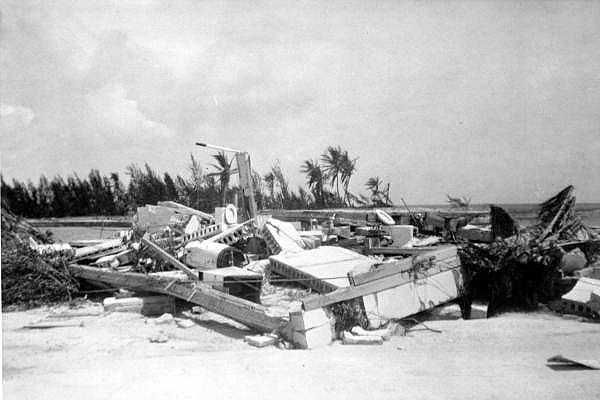Description of previous item
Description of next item
What's in a Hurricane's Name?
Published September 9, 2016 by Florida Memory
Does a hurricane’s name really matter? In the 1970s, Vice-President of the National Organization of Women (NOW) Roxcy Bolton certainly thought so. At that time the National Weather Service (NWS) selected exclusively feminine names to identify hurricanes. To the leading Florida feminist, who preferred the term “him-icane,” the established hurricane naming practice constituted a “slur on women,” with no place in the emerging women’s liberation movement. Ever a woman of action, Roxcy Bolton weathered stormy opposition for the better part of the 1970s, working to revise the gendered naming of hurricanes and challenge social perceptions of women.
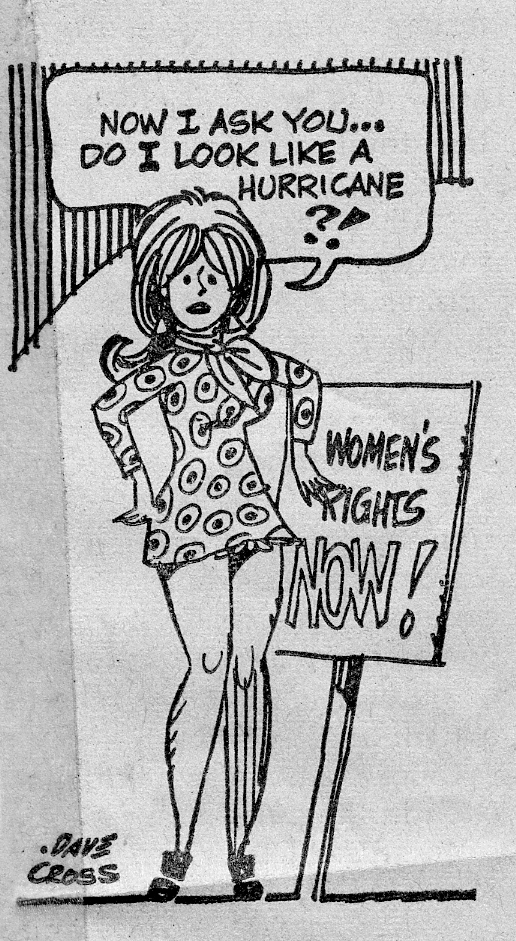
Satirical cartoon of Roxcy Bolton and the NOW campaign against the exclusive use of female names to identify hurricanes. Cartoonist Dave Cross drew this rendition of Bolton, which appeared in the local news section of the Miami Herald on March 28, 1970.
More hurricanes have hit Florida than any other state in the Union. While the National Hurricane Center dates the first recorded tempest to hit Florida to 1523, the trend of naming them after women did not start until 1953. The first, Hurricane Barbara, swept through the Outer Banks of North Carolina in August of that year. For the next twenty-five hurricane seasons, memorable “female” hurricanes like Donna (1960), Carla (1961), Inez (1966), and Gladys (1968) would claim responsibility for numerous Floridians’ deaths and the physical destruction of countless Florida communities. Roxcy Bolton, Coral Gables resident and founding member of the Miami-Dade Chapter of NOW, took stock of the all-female cast of the mid-twentieth century’s deadliest storms: “I’m sick and tired of hearing that ‘Cheryl was no lady and she devastated such and such town’ or ‘Betsy annihilated this or that,’ ” she told the press.
Bolton took her initial stand after the NWS released the predetermined list of names for the 1970 hurricane season. Alma was at the top, followed by Becky, Celia, Dorothy, Ella, and a number of other traditional feminine names all the way through to Wilna. Determined to dismantle the naming pattern, Bolton made a personal trip down to the National Hurricane Center (NHC) in Miami and demanded immediate name-changes. “Women are not disasters, destroying life and communities and leaving a lasting devastating effect,” she argued. Assistant Director of the NHC Arnold Sugg refused to alter the list, claiming “[n]o more can it [hurricane names of 1970] be changed than people can stop the Vietnam War…. [I]t’s practically impossible to make a change this late in the year.” Sugg further minimized her request, noting that the National Hurricane Center received few complaints and instead explained that “mail from women runs about 8 or 9 to one in favor of feminine names. A lot of women even ask us to name hurricanes for them.” Unmoved by the NHC’s rationalizations, Bolton suggested those women to be “too conditioned” and unaware of the social consequences of their requests, making the case that “[a]s long as people can name [hurricanes] after us it’s just another way of putting women down…. In 1970 it is time to take women seriously as human beings.”
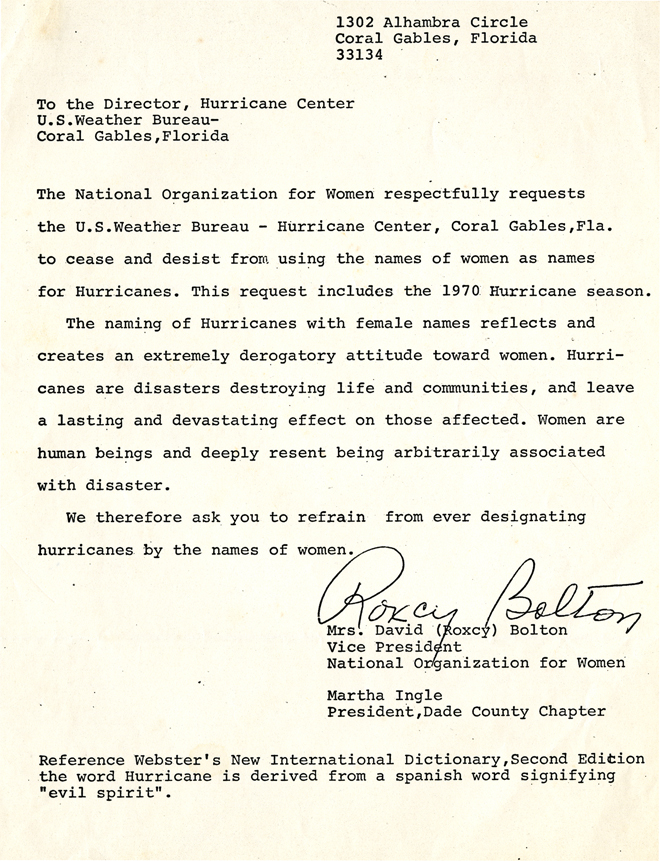
Letter from NOW to the National Hurricane Center demanding an end to the gendered naming of tropical cyclones. March 1970.
As she mounted her hurricane campaign, Bolton and other members of NOW repeatedly wrote the NWS with suggestions for alternative, less derogatory formulae for hurricane-naming. First, she publicized her distaste for the term “hurricane,” which she asserted sounded too much like “her-icane,” referring to them as “him-icanes” instead. From there, she advocated for the idea of naming hurricanes (or him-icanes) solely after U.S. senators. Associate Director of the NWS, Karl Johanssen scoffed at the idea, asking the forty-six-year-old NOW vice-president if it was her intention to “cast a slur on U.S. Senators.” “No, it’s just that senators delight in having things named after them,” she quipped. In an attempt at compromise, Johanssen suggested an alternating system in which men’s names be used one year, and women’s in the next. Bolton didn’t budge, retorting “we’ve already been blessed for 18 years, enough is enough.” She also proposed the idea of naming hurricanes after birds, but this, too, was rejected by the NWS on the grounds that it might offend the Audubon Society. Though critics accused Bolton of fabricating a gender inequality issue over the allegedly innocent naming of tropical tempests after women, she later recalled that the hurricane campaign reflected the broader goals of feminism in the early 1970s. Bolton assessed that at that time feminism was “as much about changing the role and attitudes toward [women] as putting money in their pockets.”
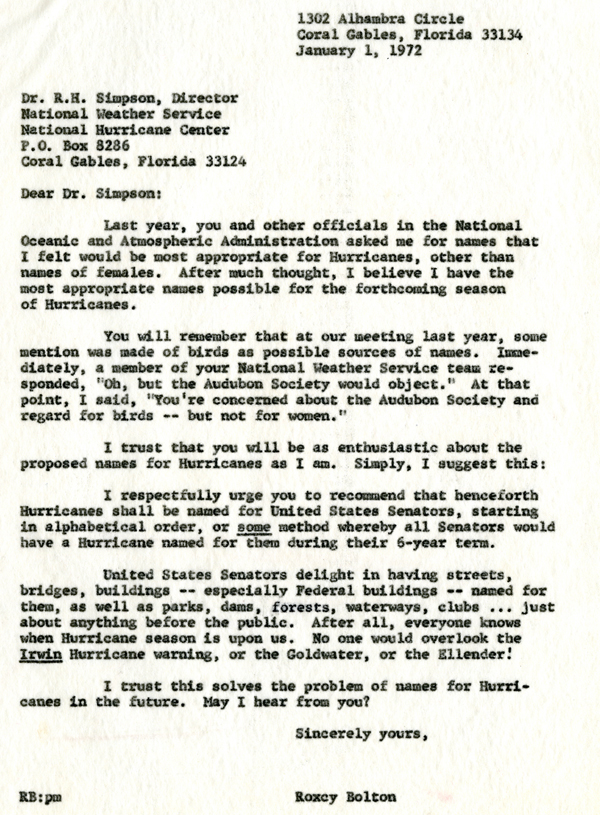
Letter from Roxcy Bolton to Director of the National Hurricane Center, Robert H. Simpson, suggesting alternatives for identifying tropical cyclones. January 2, 1972.
Finally, in 1978 the National Oceanic and Atmospheric Administration (NOAA), the federal agency overseeing the NWS and the NHC, heeded Roxcy Bolton’s requests. “Some women suggested that the naming procedure was sexist. I believe that to be true,” admitted NOAA administrator Richard Frank. NOAA ultimately agreed to a new system of generating an alternating male-female list of names every six years — a system that still remains in place today. However, Bolton maintained that she was not exactly “enthusiastic” about naming tropical cyclones after men or women because of “the negative image it projects.” 1979 would be the first hurricane season to include both male and female names. On this innovation, which garnered both national and international attention, the Christian Science Monitor concluded: “While [it] may not go down in the annals of women’s liberation as a milestone, it nevertheless is lauded by some feminists as a small victory for womankind and, they would hasten to add, mankind.” The first “male” hurricane, Bob, made landfall in Louisiana on July 11 1979. Hurricanes David, Frederic, Gloria, and Henri rounded out the 1979 season. Since then, infamous Florida hurricanes like Andrew (1992) and Ivan (2004) have joined Jeanne (2004) and Wilma (2005) in the recent memory of Florida’s most destructive natural disasters.
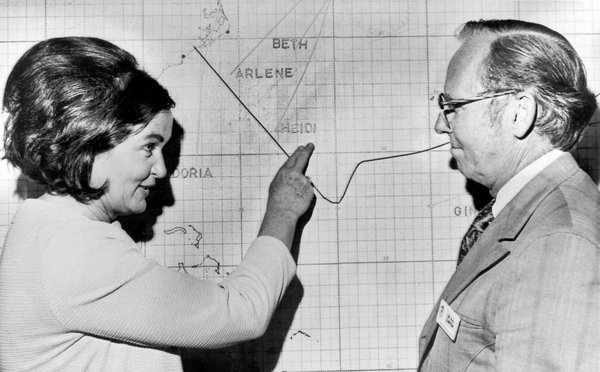
Roxcy Bolton speaking with Director of the National Hurricane Center Robert Simpson about the hurricane-naming issue in January 1972. Photograph courtesy of the Associated Press.
Pressuring weather officials to forego the tradition of using exclusively feminine sobriquets for hurricanes is just one of many of Roxcy Bolton’s contributions to gender equality in Florida. For additional resources on Roxcy Bolton’s involvement in the women’s liberation movement be sure to check out some of the highlights from the State Archives of Florida’s Roxcy Bolton Collection (M94-1) in our article “Roxcy Bolton: A Force for Equality.”
Cite This Article
Chicago Manual of Style
(17th Edition)Florida Memory. "What's in a Hurricane's Name?." Floridiana, 2016. https://www.floridamemory.com/items/show/322857.
MLA
(9th Edition)Florida Memory. "What's in a Hurricane's Name?." Floridiana, 2016, https://www.floridamemory.com/items/show/322857. Accessed February 13, 2026.
APA
(7th Edition)Florida Memory. (2016, September 9). What's in a Hurricane's Name?. Floridiana. Retrieved from https://www.floridamemory.com/items/show/322857

 Listen: The Blues Program
Listen: The Blues Program